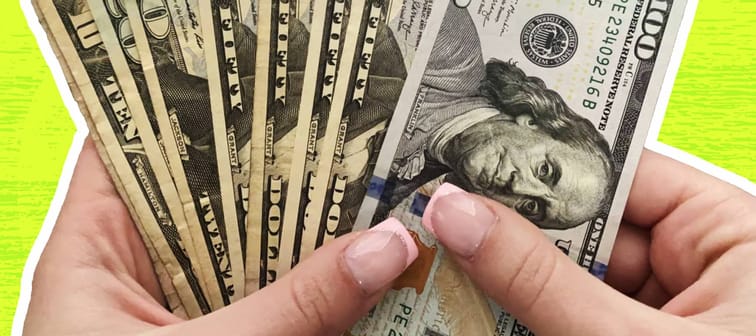What is cash stuffing ?
The budgeting method known as cash stuffing is simple: You take your paycheck in cash and divide it into envelopes based on your budget for different needs, including both spending and saving.
Cash stuffing is by no means a new phenomenon — money icons like Dave Ramsey have long recommended the budgeting method, also known as the envelope system.
“My grandma used to do it,” says Elaine King, a certified financial planner based in Miami, Florida.
How does it work?
Say you have $200 budgeted for groceries this week. You'll take that cash out of your "groceries" envelope and bring it with you to the store. If your bill ends up above $200, you will be forced to put some items back.
King says paying with cash feels more tangible, compared to paying with your credit card, especially if you’re just tapping with your phone. With digital payments pulled from one big pool of funds, it's not immediately obvious when you're going over budget.
She compares cash stuffing to kids putting coins in a piggy bank: “You need to touch it and feel it.”
More: Money budgeting tips
Kiss Your Credit Card Debt Goodbye
Having a single loan to pay off makes it easier to manage your payments, and you can often get a better interest rate than what you might be paying on credit cards and car loans.
Fiona is an online marketplace offering personalized loan options based on your unique financial situation.
When you consolidate your debt with a personal loan, you can roll your payments into one monthly installment. Find a lower interest rate and pay down your debt faster today.
Get StartedMake cash stuffing work for you
King recommends that people new to cash stuffing start with the 50/30/20 rule — 50% for your needs, 30% for your wants and 20% for your financial goals.
“I always tell people, go through your bank statements and see how much — let's say, you've been spending for groceries — for the past three to six months, and give yourself a comfortable amount that you know you're not going to go over,” adds Kuburat, a 27-year-old Canadian TikTok influencer (@itsmisssk), who began cash stuffing in early 2021. She also requested her last name be withheld.
She says you can adjust your budget month-to-month depending on your circumstances. If you go under budget, she recommends putting the extra cash toward your emergency fund or keeping it as a buffer in your bank account.
Kuburat’s goal was to save $13,000 Canadian, but she ended up saving thousands more. This also helped her start her own business, ItsMissK, where she sells budgeting materials and offers local coaching on budgeting.
Lily says her main spending categories include groceries, expenses for her dog Scooby and beauty purchases, including nails and hair. She decides how much cash to budget into each category based on her paycheck and what her priorities are at the moment.
She regularly contributes to her 401(k) plan at work, plans to open a Roth IRA in the future and puts at least $50 each into her emergency fund and her personal savings on a biweekly basis.
Young people budget to deal with rising costs
Kuburat says her savings took a big hit when the COVID-19 pandemic began.
“Everything is expensive now — food, gas. But when you budget … it gives you a better idea of how much you're going to have to put aside every single time,” explains Kuburat.
The Consumer Price Index rose 8.6% in May over the same month last year; that’s the highest increase since December 1981. Gas prices continue to peak at new records, and food prices are expected to climb between 7% and 8% this year.
Whether you use the envelope method or not, King suggests finding ways to cut back where you can — like taking public transportation or carpooling to deal with soaring gas prices. Buying groceries in bulk can often be cheaper as well, so you can split the purchase with a friend.
“I think the message here is that planning works,” she says.
Stop overpaying for home insurance
Home insurance is an essential expense – one that can often be pricey. You can lower your monthly recurring expenses by finding a more economical alternative for home insurance.
SmartFinancial can help you do just that. SmartFinancial’s online marketplace of vetted home insurance providers allows you to quickly shop around for rates from the country’s top insurance companies, and ensure you’re paying the lowest price possible for your home insurance.
Explore better ratesPeople spend less when they pay with cash
That's backed up by research. In fact, a 2001 study from Drazen Prelec and Duncan Simester of MIT reported that shoppers spend up to 100% more when they pay with credit instead of cash.
Fast-forward to 2018, and research showed Americans are still willing to spend as much as 83% more when using a credit card, in some cases.
Credit cards are useful tools, but it’s important to wield them responsibly. Banks and lenders look at your credit history and score when you apply for things like a mortgage, loan or insurance.
On the other hand, cash limits you. If you have only $50 onhand, you can’t spend over that amount — whereas it can be easier to overspend when you can just swipe your credit card and worry about the balance later. By only spending the cash you have on hand, you can avoid things like bank overdraft fees, which are usually around $35.
King recommends using your credit card for fixed expenses, such as your monthly cell phone fees or car payments, but says to be cautious when it comes to variable expenses.
“The sky's the limit. You could really go above your means.”
More: How to get rid of credit card debt
Sponsored
Follow These Steps if you Want to Retire Early
Secure your financial future with a tailored plan to maximize investments, navigate taxes, and retire comfortably.
Zoe Financial is an online platform that can match you with a network of vetted fiduciary advisors who are evaluated based on their credentials, education, experience, and pricing. The best part? - there is no fee to find an advisor.







